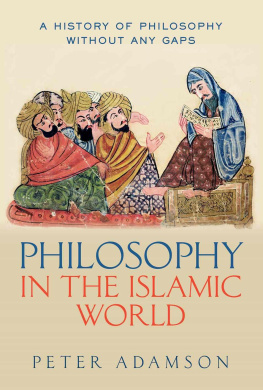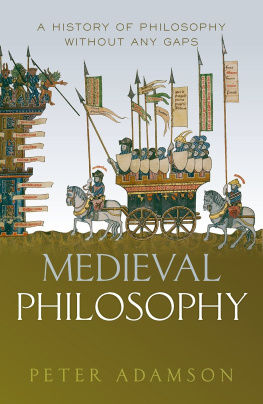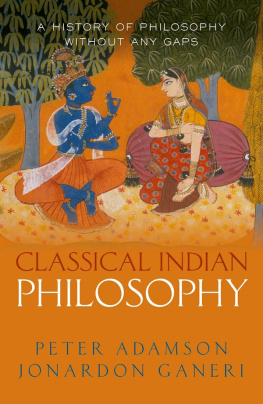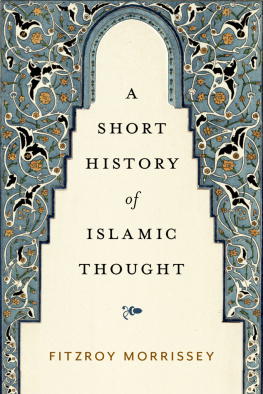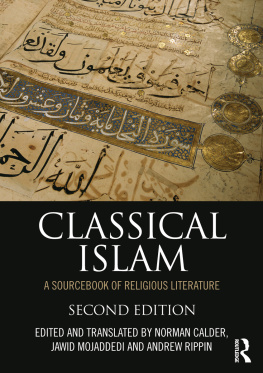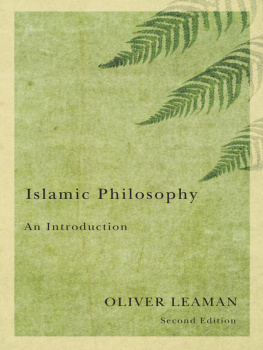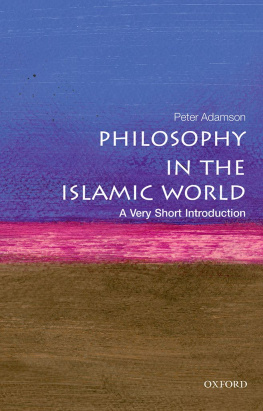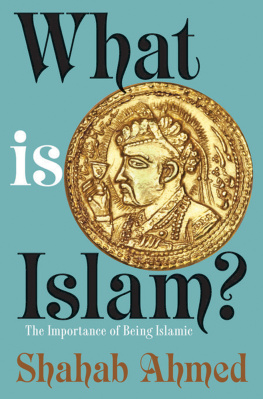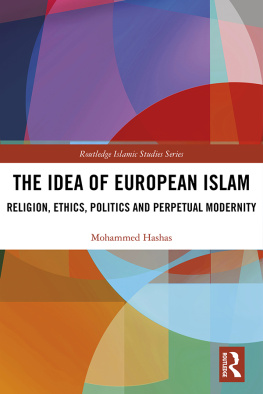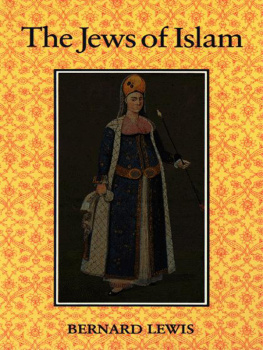Philosophy in The Islamic World
A history of philosophy without any gaps, Volume 3


Great Clarendon Street, Oxford, OX2 6DP, United Kingdom
Oxford University Press is a department of the University of Oxford. It furthers the Universitys objective of excellence in research, scholarship, and education by publishing worldwide. Oxford is a registered trade mark of Oxford University Press in the UK and in certain other countries
Peter Adamson 2016
The moral rights of the author have been asserted
First Edition published in 2016
Impression: 1
All rights reserved. No part of this publication may be reproduced, stored in a retrieval system, or transmitted, in any form or by any means, without the prior permission in writing of Oxford University Press, or as expressly permitted by law, by licence or under terms agreed with the appropriate reprographics rights organization. Enquiries concerning reproduction outside the scope of the above should be sent to the Rights Department, Oxford University Press, at the address above
You must not circulate this work in any other form and you must impose this same condition on any acquirer
Published in the United States of America by Oxford University Press 198 Madison Avenue, New York, NY 10016, United States of America
British Library Cataloguing in Publication Data
Data available
Library of Congress Control Number: 2015937779
ISBN9780199577491
ebook ISBN 9780191084850
Printed in Great Britain by Clays Ltd, St Ives plc
Links to third party websites are provided by Oxford in good faith and for information only. Oxford disclaims any responsibility for the materials contained in any third party website referenced in this work.
For Ursula
Contents
With any luck, you are not merely browsing this volume in a bookstore or online, but are a proud owner who has just lovingly taken it down from the special shelf you reserve for books likely to impress house guests. With even more luck, it resides there alongside the first two installments of The History of Philosophy Without Any Gaps. If so, you may already have noticed that it is somewhat fatter than the second volumePhilosophy in the Hellenistic and Roman Worldswhich was, in turn, already fatter than the initial offering, Classical Philosophy. Like a middle-aged parent whose work and family duties allow no time for regular exercise, the History of Philosophy has good excuses for its weight gain. In the second volume, we devoured a whole millennium of philosophy, stretching from contemporaries of Aristotle in the fourth century BC to the end of late antiquity with Boethius and Maximus the Confessor. In a further bid to satisfy your appetite for philosophy, this book will cover an even larger time-span, and a far larger geographical area to boot.
Like its predecessors, the volume youre about to read is aimed at a general audience. You need to be armed with nothing but interest in the topic. Ive tried not to assume familiarity with the territory covered in the first two volumes, though this certainly wouldnt hurt. As ever, my approach is chronological, though certain themes act as leitmotifs for the story as a whole. (For a briefer survey which instead adopts a thematic structure, see my recently appeared Very Brief Introduction to Islamic Philosophy.
For many readers, the most unexpected feature of the book will probably be the attention I devote to non-Muslim thinkers in the Islamic world. Other introductory volumes have been devoted to either Islamic philosophy or Jewish (medieval) philosophy, and these may glance along the way at the faith tradition not in focus. But as far as I know this is the only general introductory volume that offers detailed and dedicated coverage of philosophy in the Islamic world among all the Abrahamic faiths. Most of the material on Jewish philosophy will be found in the second section on Andalusia, though there are discussions of earlier Jewish thinkers in the first part too. This allows me to present medieval Jewish philosophy in its proper cultural and intellectual context. Of course there will be more to say about the history of Jewish philosophy in future volumes, with Renaissance Jews and figures like Spinoza and Mendelssohn still to come. But covering philosophy in the Islamic world without any gaps means examining one of the most important stretches in the history of Jewish philosophy. Less extensive but no less important to the volume is the discussion of Christian philosophy in the Islamic world, especially the so-called Baghdad School of Christian Aristotelians.
The book is based on the scripts for the History of Philosophy podcast, though as with the earlier volumes I have revised these substantially and added some material, for instance the aforementioned consideration of taqld under the Ottomans. This version also has the advantage of giving references to the primary texts I am discussing, as well as additional notes and suggestions for further reading. I hope that this will inspire and assist you to read more widely about a topic that has become a dynamic and exciting field within the history of philosophy over the past couple of decades. With the increasing number of reliable translations, it is no longer necessary to know Arabic (or Hebrew, or Persian) to familiarize yourself with the amazing quantity and quality of philosophical literature in the Islamic world. Indeed, when I launched this series of podcasts and books, part of my aim was to build up an audience with curiosity about ancient philosophy, who I hoped might stick with me once I reached the less widely known territory covered in this book. If you are indeed coming to this after reading the first two books, then thank you for continuing the journey. If you are new to the series, then hopefully youll agree that the book does stand on its own. Either way, I now invite you to embark on the third volume of the History of Philosophy, without any gaps.
Given that my own main area of research is philosophy in the Islamic world, you might think that in writing this book I would have needed little advice and assistance from other scholars. To be honest, I might have thought that myself at some point, but it turned out to be very much otherwise. So sprawling and complex are the intellectual traditions surveyed here that I was glad to profit from the advice of many friends and colleagues. Invaluable advice and feedback on the chapters concerning Jewish philosophy were provided by Jeremy Brown and Daniel Davies, and especially by Steven Harvey, who kindly and carefully read all these chapters in their revised form and saved me from numerous imprecisions and errors. Id also like to give a special mention to Lukas Mhlethaler, who convinced me that it would indeed make sense to integrate Jewish philosophy into this book, rather than giving it separate treatment. For the rest of the volume, I received helpful advice from Asad Ahmed, Lisa Alexandrine, Ahab Bdaiwi, Sonja Brentjes, Jonathan Dub, Khaled El-Rouayheb, Jan-Peter Hartung, Andreas Lammer, Jon McGinnis, Christoph Neumann, Reza Pourjavady, Sajjad Rizvi, M. Sait zervarl, and Eric van Lit, as well as three anonymous referees who made numerous valuable corrections and suggestions. Id further like to thank the impressive line-up of scholars who agreed to be interviewed for the podcast: Deborah Black, Farhad Daftary, Gad Freudenthal, Frank Griffel, Dimitri Gutas, Sarah Pessin, Peter E. Pormann, Sajjad Rizvi, Tamar Rudavsky, Mohammed Rustom, Sarah Stroumsa, Richard C. Taylor, Anke von Kgelgen, and Robert Wisnovsky. I am grateful also to Julian Rimmer for his tireless help with the podcast website, Andreas Lammer for his work editing the podcasts, and Fedor Benevich for his labors on the index to this book. The whole project has thrived thanks to the financial support of the Philosophy Department at Kings College London, the Leverhulme Trust, and the Ludwig-Maximilians-Universitt in Munich.

